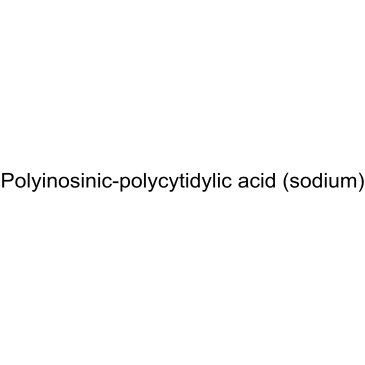Polyinosinic-polycytidylic acid sodium |
| カタログ番号GC60297 |
ポリイノシン-ポリシチジル酸ナトリウム (Poly(I:C) ナトリウム) は、二本鎖 RNA の合成類似体であり、toll 様受容体 3 (TLR3) およびレチノイン酸誘導性遺伝子 I (RIG-I) 様受容体のアゴニストです ( RIG-I および MDA5)。
Products are for research use only. Not for human use. We do not sell to patients.

Cas No.: 42424-50-0
Sample solution is provided at 25 µL, 10mM.
Polyinosinic-polycytidylic acid sodium(Poly I:C) is a synthetic dsRNA that can imitate a viral infection and elicit host immune responses by triggering specific pattern-recognition receptors (PRRs) such as toll-like receptor 3(TLR3) and retinoic acid inducible gene I(RIG-I)-like receptors, including RIG-I and melanoma differentiation-associated gene 5. Poly I:C can be used as a vaccine adjuvant for cancer immunotherapy[1-3].
poly(I:C)(20 µg in 0.2 mL of cell suspension)-electroporated AML cells potently activate DC and NK cell functions and stimulate NK-DC cross-talk in terms of tumor cell killing[4]. Activation of the TLR3 signaling pathway in cancer cells through poly I:C(100 µg/ml;72 h) makes Hela cells (human cervical cancer) dose-dependent sensitive to apoptosis induced by the protein synthesis inhibitor cycloheximide (CHX) [5].
Poly I:C(10 µg/g;p.o.) exposure induces severe intestinal injury and inflammation[6]. Pre-treatment with the viral TLR3 agonist poly(I:C) (20/200 µg) modulated innate immune responses and strengthened the resistance of neutropenic mice against E. coli K1 meningoencephalitis[7].The intratumoral synergistic combination of poly(I:C)(25 µg;i.p; six times from day9-day21)+R848 significantly prevented tumor growth and metastasis in lung cancer and fibrosarcoma immunocompetent murine models[8].
References:
[1]. Zhao X, Ai M, et,al. Poly I:C-induced tumor cell apoptosis mediated by pattern-recognition receptors. Cancer Biother Radiopharm. 2012 Nov;27(9):530-4. doi: 10.1089/cbr.2012.1226. Epub 2012 Oct 12. PMID: 23062195.
[2]. Zhao X, Ai M, et,al.Poly I:C-induced tumor cell apoptosis mediated by pattern-recognition receptors. Cancer Biother Radiopharm. 2012 Nov;27(9):530-4. doi: 10.1089/cbr.2012.1226. Epub 2012 Oct 12. PMID: 23062195.
[3]. Kato H, Takeuchi O, et,al.Differential roles of MDA5 and RIG-I helicases in the recognition of RNA viruses. Nature. 2006 May 4;441(7089):101-5. doi: 10.1038/nature04734. Epub 2006 Apr 9. PMID: 16625202.
[4]. Lion E, Anguille S, et,al.Poly(I:C) enhances the susceptibility of leukemic cells to NK cell cytotoxicity and phagocytosis by DC. PLoS One. 2011;6(6):e20952. doi: 10.1371/journal.pone.0020952. Epub 2011 Jun 17. PMID: 21698118; PMCID: PMC3117863.
[5]. Jiang Q, Wei H, et,al.Poly I:C enhances cycloheximide-induced apoptosis of tumor cells through TLR3 pathway. BMC Cancer. 2008 Jan 17;8:12. doi: 10.1186/1471-2407-8-12. PMID: 18199340; PMCID: PMC2242792.
[6]. Ginzel M, Yu Y, et,al.The viral dsRNA analogue poly (I:C) induces necrotizing enterocolitis in neonatal mice. Pediatr Res. 2016 Apr;79(4):596-602. doi: 10.1038/pr.2015.261. Epub 2015 Dec 17. PMID: 26679153.
[7]. Ribes S, Arcilla C, et,al.Pre-treatment with the viral Toll-like receptor 3 agonist poly(I:C) modulates innate immunity and protects neutropenic mice infected intracerebrally with Escherichia coli. J Neuroinflammation. 2020 Jan 17;17(1):24. doi: 10.1186/s12974-020-1700-4. PMID: 31952519; PMCID: PMC6969464.
[8]. Anfray C, Mainini F, et,al.Intratumoral combination therapy with poly(I:C) and resiquimod synergistically triggers tumor-associated macrophages for effective systemic antitumoral immunity. J Immunother Cancer. 2021 Sep;9(9):e002408. doi: 10.1136/jitc-2021-002408. PMID: 34531246; PMCID: PMC8449972.
Average Rating: 5 (Based on Reviews and 14 reference(s) in Google Scholar.)
GLPBIO products are for RESEARCH USE ONLY. Please make sure your review or question is research based.
Required fields are marked with *




















